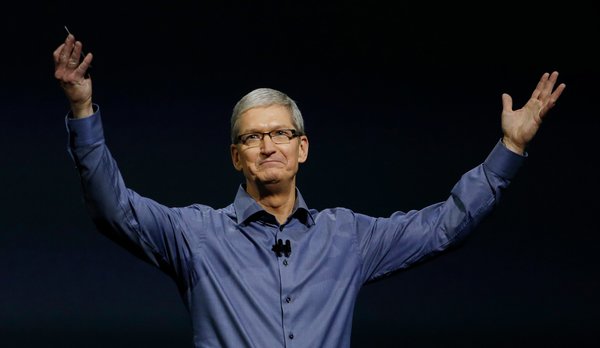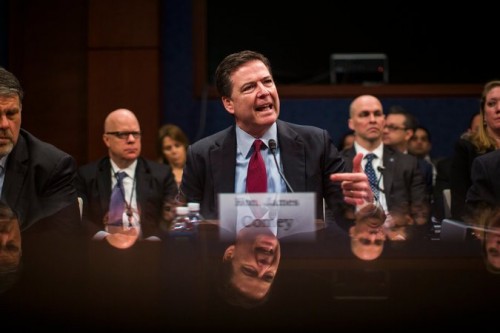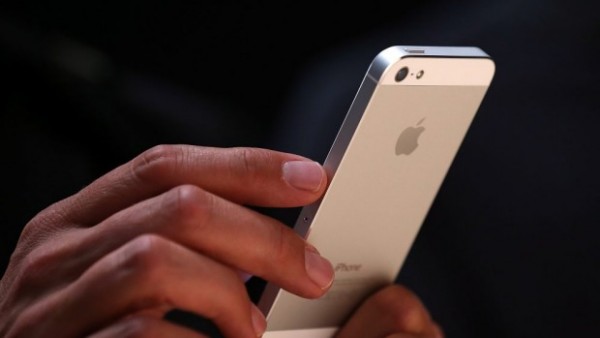
The legal wrangling over a federal court order requiring Apple to help law enforcement break into an iPhone intensified Thursday, with the company filing its formal response and asking the court to drop its demand.
Other technology companies — Microsoft, Google, Twitter, Facebook and Yahoo — also moved to throw their weight behind Apple in court. The companies said they planned to file one or more briefs backing Apple next week in federal court in California.
The flurry of legal activity by the companies came as the F.B.I. also escalated the matter, calling on Congress to settle the question of when law enforcement should get access to citizens’ private data. Apple earlier this week had also asked for Congress to step in.
“The larger question isn’t going to be answered in the courts, and shouldn’t be,” James B. Comey Jr., the F.B.I. director, said in a hearing of the House Intelligence Committee earlier on Thursday. “It’s really about who do we want to be as a country and how do we want to govern ourselves.”
The day’s events were among the most active yet in a case set in motion last week by Magistrate Judge Sheri Pym of the Federal District Court for the Central District of California. Judge Pym ordered Apple to weaken its security functions so the United States government could unlock the iPhoneused by one of the gunmen in a mass shooting in December in San Bernardino, Calif., to help the investigation. Apple immediately said it opposed the order, prompting a heated back-and-forth in a situation fueling a debate over privacy and civil liberties versus security.
The fight is an important moment in the growing tension between tech companies that have access to huge amounts of private customer data and the government, which has long sought greater access to that information. Apple has said customer data must remain accessible only to customers to protect their civil liberties. Law enforcement officials like Mr. Comey say that increasingly robust encryption technology is hurting their ability to fight criminals.
From Apple’s Motion:
“Compelling Apple to create software in this case will set a dangerous precedent for conscripting Apple and other technology companies to develop technology to do the government’s bidding in untold future criminal investigations.”
The case may eventually end up before the Supreme Court. Timothy D. Cook, Apple’s chief executive, has said, “We would be prepared to take this issue all the way.”
In Apple’s formal response to the court on Thursday, which was filed a day ahead of a Friday deadline, the company said the court should drop its order because it oversteps an existing law known as the All Writs Act, as well as Apple’s First Amendment and Fifth Amendment rights.

“Apple strongly supports, and will continue to support, the efforts of law enforcement in pursuing justice against terrorists and other criminals — just as it has in this case and many others,” the company said in its filing, known as a motion to vacate. “But the unprecedented order requested by the government finds no support in the law and would violate the Constitution.”
Apple added that the order had broad implications that would “inflict significant harm — to civil liberties, society and national security — and would pre-empt decisions that should be left to the will of the people through laws passed by Congress and signed by the president.”
Specifically, Apple argued that a 1789 statute known as the All Writs Act, which the government has used in the past to request user data from Apple, does not give the court the power it seeks in this case. While the F.B.I. has previously used the All Writs Act to obtain information from Apple, the company said “Congress has never authorized judges to compel innocent third parties to provide decryption services to the F.B.I.”
A Justice Department spokeswoman said investigators had long held the power to secure court orders that compel outside parties like Apple to assist with search warrants.
“The Justice Department’s approach to investigating and prosecuting crimes has remained the same,” said Melanie Newman, the department spokeswoman. “The change has come in Apple’s recent decision to reverse its longstanding cooperation in complying with All Writs Act orders.”
Apple also argued that if the government forced it to create new code to unlock the iPhone of the San Bernardino gunman, that would amount to “compelled speech and viewpoint discrimination,” both of which are violations of the First Amendment right to free speech. The company also said the court order violated the company’s Fifth Amendment right to due process because it deprives Apple of the right to be free from “arbitrary deprivation” of its liberty by government.
Legal experts said it was unlikely that a judge would rely on constitutional arguments to make a decision in this early stage. “But given the likelihood that this will move to an appeals court and even further, Apple needs to include all of its arguments in the lower court if it wants to raise them again in a higher court,” said Larry Downes, project director at the Georgetown Center for Business and Public Policy.
Even as Apple was preparing to formally respond to the court, other technology companies — which have until now been cautious in their support of Apple — were preparing to be more forceful in court. Earlier Thursday, Microsoft’s president and chief legal officer, Brad Smith, speaking at a congressional hearing tangentially related to the Apple case, said the software maker would file a brief backing Apple next week.
Mr. Smith in particular took aim at the All Writs Act, which was passed in its current form in 1911, as being too antiquated to be used now in situations with modern technology. To emphasize his point that law enforcement authorities are relying on outdated laws, he placed on a table an adding machine from the early 1900s that he had purchased on eBay.
“The leading computing device from that era is right in front of me,” he said.
Press officials from Google, Facebook and Twitter confirmed that the tech companies would be filing a joint brief supporting Apple. Yahoo said it also would file a brief.
 Last week, Google’s chief executive, Sundar Pichai, wrote on Twitter that law enforcement demands to hack customer devices and data “could be a troubling precedent.” Jack Dorsey, Twitter’s chief executive, also wrote on Twitter in support of Apple. This week, Facebook’s chief executive, Mark Zuckerberg, also said he supported Apple.
Last week, Google’s chief executive, Sundar Pichai, wrote on Twitter that law enforcement demands to hack customer devices and data “could be a troubling precedent.” Jack Dorsey, Twitter’s chief executive, also wrote on Twitter in support of Apple. This week, Facebook’s chief executive, Mark Zuckerberg, also said he supported Apple.
“I don’t think building back doors is the way to go, so we’re pretty sympathetic to Tim and Apple,” Mr. Zuckerberg said.
It is unlikely that a divided, gridlocked Congress will offer clear answers to questions about security and privacy anytime soon. Several lawmakers who questioned Mr. Comey on Thursday said that they weren’t sure where to draw the line between consumer privacy and the needs of law enforcement.
Obama administration officials had drafted legislation in 2011 that sought to address the privacy issues now being raised, but the proposals were effectively shelved after the former government contractor Edward J. Snowden leaked information about the government’s mass surveillance programs.
Next Tuesday, the House Judiciary Committee will hold a hearing titled “The Encryption Tightrope: Balancing Americans’ Security and Privacy.” Those set to testify include Bruce Sewell, Apple’s general counsel, along with Mr. Comey and the Manhattan district attorney, Cyrus R. Vance Jr.
THE NEW YORK TIMES

Leave a Reply
You must be logged in to post a comment.